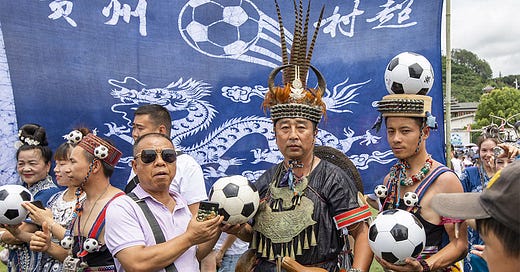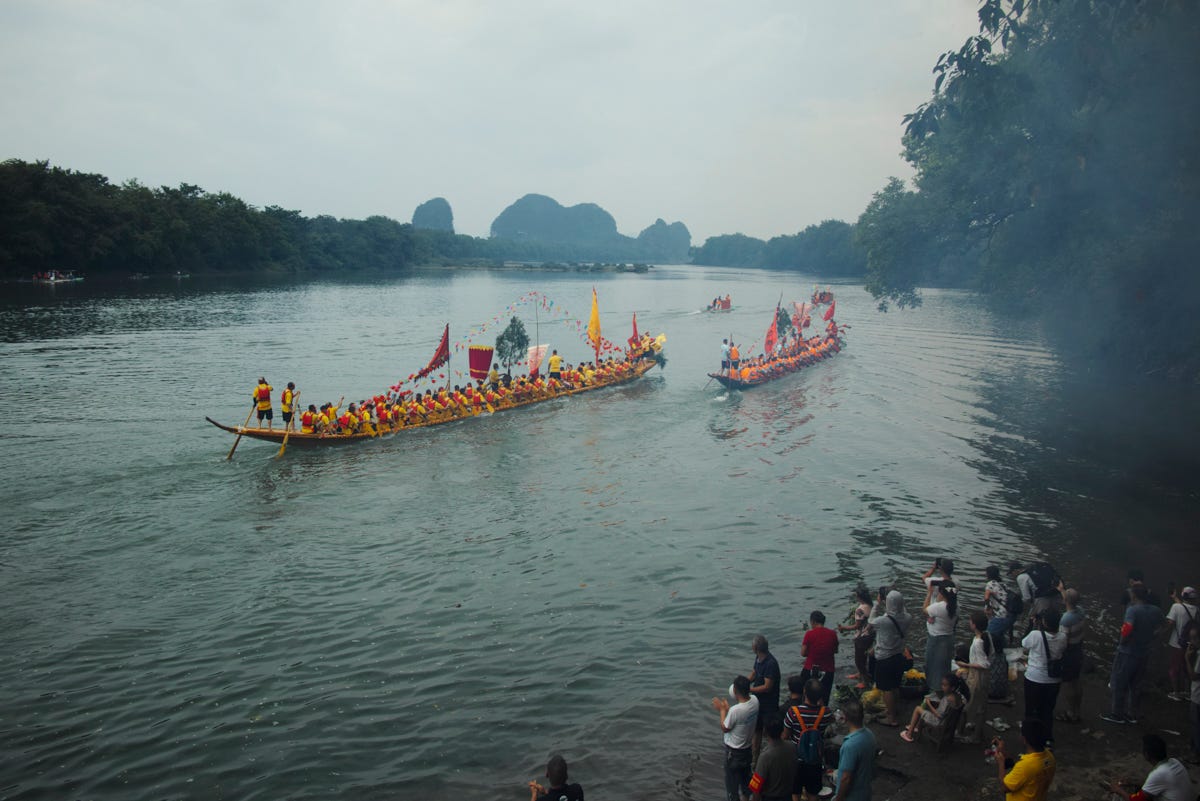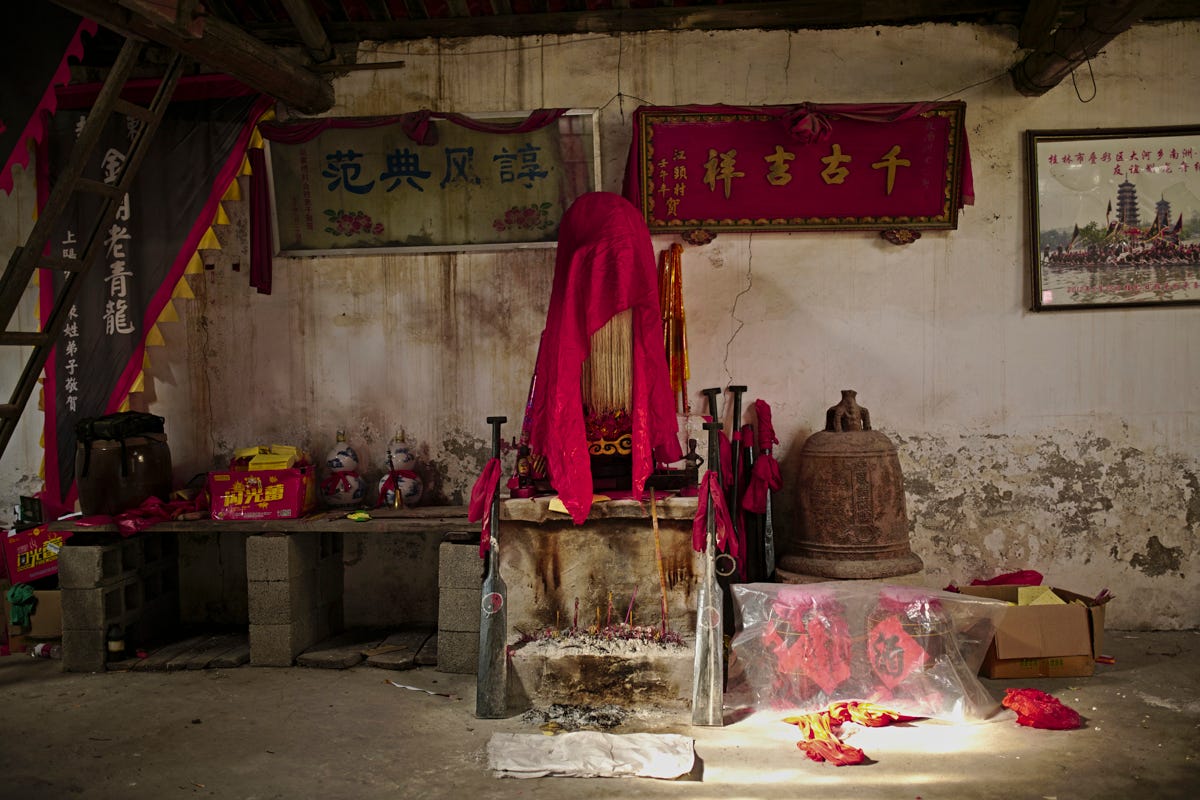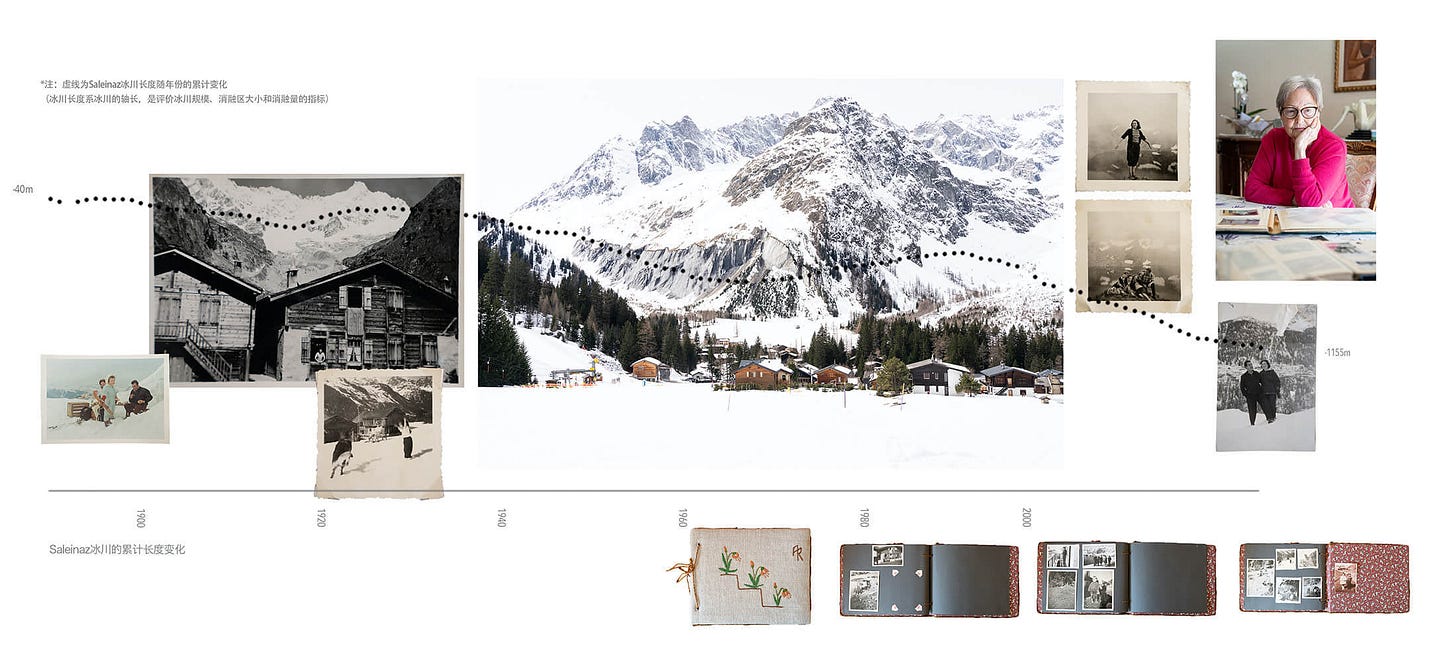Hello there,
After the bizarre hype around Zibo Barbeque earlier this year, where millions of people flocked to an obscure industrial city to eat skewers, China is once again captivated by two unexpected (but sensational) destinations this summer.
We kick things off with Cunchao, a grassroots soccer tournament in Guizhou that's creating buzz akin to the World Cup or Superbowl. Featuring passionate games between rural villages and a dazzling display of local food and entertainment, Cunchao has brought substantial revenue and world attention to an impoverished corner of this southwestern province. Even former England Captain Michael Owen is a fan.
Then, we journey to the rivers of Guangdong for “Landlords’ Games”, where the ancient ritual of dragon boat racing thrives alongside modern internet humor.
The second half of this issue covers a more serious topic—the urgency of climate change and responses to its effects. In a week where devastating images have been shared from the floods in Beijing, we'd like to show you a documentary about farmers in central Henan rushing to save their yield amidst unexpected rains. Additionally, we’ll journey to Switzerland where a Chinese photographer connects the glaciers with the people who reside near them.
Far & Near is a completely independent and paywall-free newsletter. Currently, only 1.5% of our readers are paying members. With your help, we can continue to produce high-quality stories that celebrate the creativity within China and share remarkable human-centric narratives that often go unnoticed.
1. A League of their Own: China’s Village Soccer Spectacular
Every now and then, Chinese soccer fans grapple with a painful question.“Why can’t we pick 11 players from 1.4 billion people to form a good-enough men’s soccer team?” Despite implementing top-down measures to boost the national team’s performance, from acquiring foreign talents through naturalization programs to encouraging soccer courses in primary and middle schools, the men’s team continues to disappoint fans. China failed (again) to qualify for the World Cup finals last year, losing to Oman and Vietnam.
In the southwestern province of Guizhou, a grassroots soccer tournament called Cunchao (lit. "Village Super League") has captured nationwide attention both online and offline. Self-organized by local villagers and residents, Cunchao games are not just soccer matches between villages but also feature showcases of singing and dancing at halftime, and feasts of street food and drinks on the sidelines. The joy that Cunchao brings to both players and spectators is what sets it apart from its "professional" counterparts. Meanwhile, the local government has seized the opportunity to promote Cunchao, turning it into a tourist attraction. According to a Xinhua report, Cunchao has brought Rongjiang County over 1 billion RMB in tourism revenue this May, a significant number for a county that was struggling just above the official poverty line. Although the formal narrative around Cunchao tends to center economic development, locals enjoy it because of their passion for the sport and sense of pride in local ethnic culture and diversity. While it is unclear whether this nationwide sensation can sustain continued interest from the rest of China, local teams are ready and eager to pass down the sport and its culture to younger generations.
“Landlords’ Games”
Dragon boat racing became all the rage last month during the celebration of — well, the Dragon Boat Festival. (In Chinese, it’s actually called Duanwu, or “the fifth day of May” on the lunar calendar). The ritual of dragon boat racing is particularly well preserved in southern China. This year, races on the rivers in Guangdong went viral, humorously dubbed “The Landlord’s Games”. If online rumors are to be believed, one can't even set foot on these boats without a net worth of a billion yuan or two. These “landlords”, however, are likely just former residents of villages that have now been absorbed by cities, and in the process gained property as government compensation for their lost land.
“Behind the label of the "Landlord’s Games" are villages with a strong kinship structure, and the big clans that once controlled local resources, including water navigation rights,” writes Chen Sisi in the publication Lonely Library. The race, a traditional cultural practice, still holds significance for these disparate villages to stay connected and maintain their connected heritage.
Accompanied by photographer Yang Xiao, Chen delved into the world of dragon boat racing in an urban village in Foshan, Guangdong province. Later, they also explored the quieter, less-commercialized scene in Guilin, Guangxi province, where locals used the occasion to pay tribute to the Dragon King, the god of waters. Chen and Yang also observed a disheartening trend of ancestral shrines being demolished or threatened, leaving the deities with no home. This story shows, powerfully, the significance of ritual as a means to continue tradition, even (or especially) when the lands and temples that serve as the harbors for their beliefs no longer exist.
3. Between the Rains: Inside Henan’s Wheat Crisis
Due to climate change, wheat farmers in the central province of Henan can no longer rely on the traditional solar terms created thousands of years ago to guide them. Take sowing for example: instead of starting on October 5th as usual, farmers now have to wait for 10 to 15 more days until the weather is right for planting seeds.
And that is just a small adjustment compared to the devastation wrought by extreme weather events that farmers have had to face this summer. In late May, Henan experienced the worst pre-harvest rain in more than a decade, which led to crops sprouting prematurely, lowering quality. This comprehensive Sixth Tone video chronicles the anxieties and struggles faced by wheat farmers as they raced against time to save a year's yield before another unpredictable spell of rain. The tense mood captured in this video is a reminder of the urgency we face as the global temperature increase approaches the 1.5-degree threshold.
Other highlights:
Although this newsletter focuses on China through Chinese eyes, we’re also happy when Chinese visual journalists and artists break away from their typical subjects and approach. Earlier this year, photojournalist Liang Yingfei produced a body of work titled “The Death of Giants” at an artist residency in Switzerland. Through this project, she explored the profound relationship between residents of a Swiss mountain town and the glaciers nearby, many of which have been sadly retreating in recent years.
View the project here (paywalled)
Watch Yingfei talk about this work: Part 1, Part 2, and Part 3
Who we are:
Yan Cong is formerly a photojournalist currently pursuing a research MA in new media and digital culture in Amsterdam.
Beimeng Fu is a video journalist based in Shanghai. She is a lover of languages and documentaries.
Ye Charlotte Ming is a journalist and visual editor covering stories about culture, history, and identity. She’s based in Berlin.
Writers: Yan Cong, Charlotte Ming. Copy editor: Krish Raghav
If you like this post, please share it with others and consider becoming a paying member.
If you’d like to make a one-time donation, click here:






